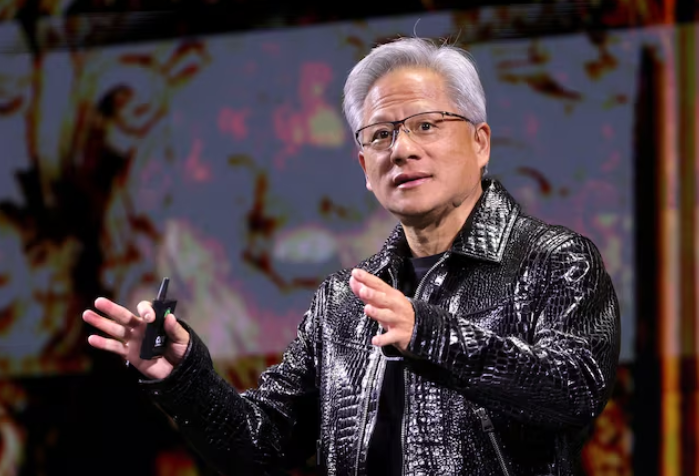TECHNOLOGY

NVIDIA CEO SET TO DEFEND AI LEADERSHIP AMID RISING COMPETITION
March 17 (Reuters) - When Nvidia CEO Jensen Huang takes the stage this week for the company's annual software developer conference, he will defend his nearly $3 trillion chip company's dominance as pressure mounts on its biggest customers to rein in the costs of artificial intelligence.
Nvidia's conference follows a shake-up in U.S. markets after China's DeepSeek unveiled a competitive chatbot, claiming it required less computing power than its rivals. Nvidia's (NVDA.O) stock took a hit, as its business relies heavily on selling high-powered chips—priced at tens of thousands of dollars each—which has driven its revenue to $130.5 billion, more than quadrupling over the past three years.
At the conference, Nvidia is set to unveil details about its upcoming chip system, Vera Rubin, named after the astronomer who advanced the study of dark matter. The system is expected to enter mass production later this year. This announcement comes as its predecessor, a chip named after mathematician David Blackwell, faces delays in reaching the market—setbacks that have impacted Nvidia's margins.
Nvidia's core revenue drivers are under pressure as the AI industry shifts focus from "training"—feeding massive datasets into AI models to enhance intelligence—to "inference", where models generate real-time responses for users. While Nvidia dominates the training market with a share exceeding 90%, it faces growing competition in inference. The extent to which rivals capture this segment will depend on the evolving landscape of inference computing.
Bigger Hammers
Inference computing takes various forms, from smartphones rewording emails to large-scale data centers analyzing financial documents. Numerous startups in Silicon Valley and beyond, along with Nvidia’s traditional competitors like Advanced Micro Devices (AMD.O), are betting that their chips can deliver the same results at a lower total cost—especially when it comes to energy consumption. Nvidia's chips require so much power that some AI companies are even exploring the use of nuclear reactors to sustain their operations.
"They have a hammer, and they're just making bigger hammers," said Bob Beachler, vice president at Untether AI, one of at least 60 startups aiming to challenge Nvidia in the inference market. "They dominate the training market, and every new chip they release carries a lot of training baggage."
Nvidia Bets on "Reasoning" AI
Nvidia argues that a new type of AI called "reasoning" could work in its favor. Unlike traditional models, reasoning-based chatbots generate a few lines of text, then reanalyze their output to refine their responses—requiring significantly more computing power, an area where Nvidia's chips excel.
"The market for inference will be many times larger than the training market," said Jay Goldberg, CEO of D2D Advisory, a finance and strategy consulting firm. "As inference grows, Nvidia's market share percentage may decline, but the total market size and revenue opportunities could expand significantly."
Beyond Chatbots: Nvidia Eyes New AI Markets
Nvidia is also expected to reveal plans for broader computing markets, including AI-driven robotics, leveraging the same advancements that have improved chatbots.
A major focus will be quantum computing. In January, Nvidia CEO Jensen Huang suggested that quantum technology was still decades away, causing stock prices of quantum-focused companies to plunge. In response, Microsoft (MSFT.O) and Google (GOOGL.O) pushed back with claims that the technology is closer to becoming practical. Nvidia has since announced that it will dedicate an entire day of its conference to discussing the state of the quantum industry and its own strategic plans in the field.
"This represents a significant development in our ongoing coverage of current events."— Editorial Board









